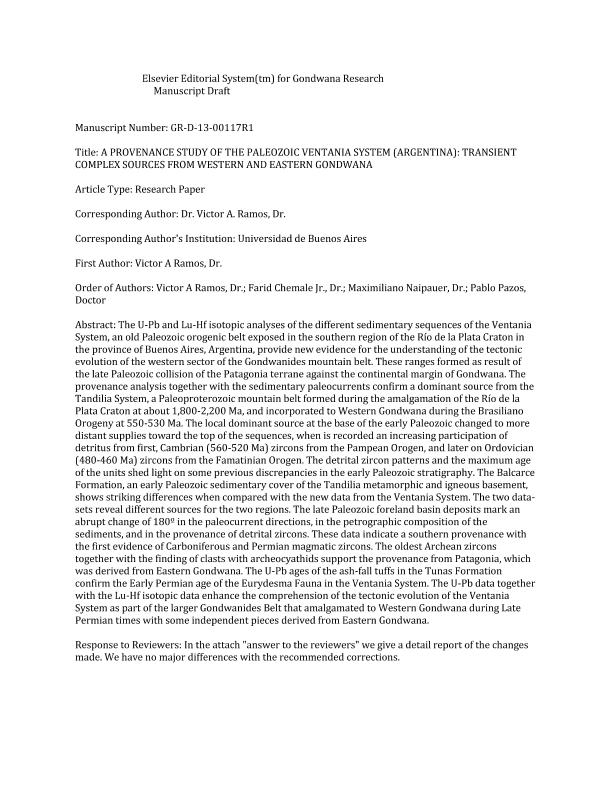Mostrar el registro sencillo del ítem
dc.contributor.author
Ramos, Victor Alberto

dc.contributor.author
Chemale, Farid

dc.contributor.author
Naipauer, Maximiliano

dc.contributor.author
Pazos, Pablo Jose

dc.date.available
2017-06-19T18:09:48Z
dc.date.issued
2014-09
dc.identifier.citation
Ramos, Victor Alberto; Chemale, Farid; Naipauer, Maximiliano; Pazos, Pablo Jose; A provenance study of the Paleozoic Ventania System (Argentina): Transient complex sources from Western and Eastern Gondwana; Elsevier Science; Gondwana Research; 26; 2; 9-2014; 719-740
dc.identifier.issn
1342-937X
dc.identifier.uri
http://hdl.handle.net/11336/18439
dc.description.abstract
The U–Pb and Lu–Hf isotopic analyses of the different sedimentary sequences of the Ventania System, an old Paleozoic orogenic belt exposed in the southern region of the Río de la Plata Craton in the province of Buenos Aires, Argentina, provide new evidence for the understanding of the tectonic evolution of the western sector of the Gondwanides mountain belt. These ranges formed as result of the late Paleozoic collision of the Patagonia terrane against the continental margin of Gondwana. The provenance analysis together with the sedimentary paleocurrents confirm a dominant source from the Tandilia System, a Paleoproterozoic mountain belt formed during the amalgamation of the Río de la Plata Craton at about 1800–2200 Ma, and incorporated to Western Gondwana during the Brasiliano Orogeny at 550–530 Ma. The local dominant source at the base of the early Paleozoic changed to more distant supplies toward the top of the sequences, when an increasing participation of detritus from first, Cambrian (560–520 Ma) zircons from the Pampean Orogen, and later on Ordovician (480–460 Ma) zircons from the Famatinian Orogen is recorded. The detrital zircon patterns and the maximum age of the units shed light on some previous discrepancies in the early Paleozoic stratigraphy. The Balcarce Formation, an early Paleozoic sedimentary cover of the Tandilia metamorphic and igneous basement, shows striking differences when compared with the new data from the Ventania System. The two data-sets reveal different sources for the two regions. The late Paleozoic foreland basin deposits mark an abrupt change of 180° in the paleocurrent directions, in the petrographic composition of the sediments, and in the provenance of detrital zircons. These data indicate a southern provenance with the first evidence of Carboniferous and Permian magmatic zircons. The oldest Archean zircons together with the finding of clasts with archeocyathids support the provenance from Patagonia, which was derived from Eastern Gondwana. The U–Pb ages of the ash-fall tuffs in the Tunas Formation confirm the Early Permian age of the Eurydesma Fauna in the Ventania System. The U–Pb data together with the Lu–Hf isotopic data enhance the comprehension of the tectonic evolution of the Ventania System as part of the larger Gondwanides Belt that amalgamated to Western Gondwana during Late Permian times with some independent pieces derived from Eastern Gondwana.
dc.format
application/pdf
dc.language.iso
eng
dc.publisher
Elsevier Science

dc.rights
info:eu-repo/semantics/openAccess
dc.rights.uri
https://creativecommons.org/licenses/by-nc-nd/2.5/ar/
dc.subject
Gondwanides
dc.subject
Eurydesma Fauna
dc.subject
Patagonia
dc.subject
Tectonics
dc.subject.classification
Geología

dc.subject.classification
Ciencias de la Tierra y relacionadas con el Medio Ambiente

dc.subject.classification
CIENCIAS NATURALES Y EXACTAS

dc.title
A provenance study of the Paleozoic Ventania System (Argentina): Transient complex sources from Western and Eastern Gondwana
dc.type
info:eu-repo/semantics/article
dc.type
info:ar-repo/semantics/artículo
dc.type
info:eu-repo/semantics/publishedVersion
dc.date.updated
2017-06-19T17:27:11Z
dc.journal.volume
26
dc.journal.number
2
dc.journal.pagination
719-740
dc.journal.pais
Países Bajos

dc.journal.ciudad
Amsterdam
dc.description.fil
Fil: Ramos, Victor Alberto. Consejo Nacional de Investigaciones Científicas y Técnicas. Oficina de Coordinación Administrativa Ciudad Universitaria. Instituto de Estudios Andinos "Don Pablo Groeber". Universidad de Buenos Aires. Facultad de Ciencias Exactas y Naturales. Instituto de Estudios Andinos ; Argentina
dc.description.fil
Fil: Chemale, Farid. Universidade Do Brasilia; Brasil
dc.description.fil
Fil: Naipauer, Maximiliano. Consejo Nacional de Investigaciones Científicas y Técnicas. Oficina de Coordinación Administrativa Ciudad Universitaria. Instituto de Estudios Andinos "Don Pablo Groeber". Universidad de Buenos Aires. Facultad de Ciencias Exactas y Naturales. Instituto de Estudios Andinos ; Argentina
dc.description.fil
Fil: Pazos, Pablo Jose. Consejo Nacional de Investigaciones Científicas y Técnicas. Oficina de Coordinación Administrativa Ciudad Universitaria. Instituto de Estudios Andinos "Don Pablo Groeber". Universidad de Buenos Aires. Facultad de Ciencias Exactas y Naturales. Instituto de Estudios Andinos ; Argentina
dc.journal.title
Gondwana Research

dc.relation.alternativeid
info:eu-repo/semantics/altIdentifier/doi/http://dx.doi.org/10.1016/j.gr.2013.07.008
dc.relation.alternativeid
info:eu-repo/semantics/altIdentifier/url/http://www.sciencedirect.com/science/article/pii/S1342937X13002359
Archivos asociados
